新概念英语第二册课堂笔记第20课
新概念英语第二册第20课

• 懂得,理解 = understand • catch the sentence • catch up with sb.
• • • • •
赶上… catch one’s attention 吸引…的注意力 catch fire 着火
• 2. fish (c. n.) 鱼 • a fish two fish • sheep deer • all kinds of fishes • 各种各样的鱼 • (u. n.) 鱼肉 • a pound of fish • (v.) 钓鱼 • go fishing • a fishing boat / hook / rod • 渔船/鱼钩/鱼竿
• • • • • •
I am even less lucky. lucky-luckier-the luckiest lucky-more lucky-the most lucky lucky-less lucky-the least lucky a little/much/even+adj./adv.比较级 I never catch anything---not even old boots. • not even • 甚至连…都没有
•
After having spent whole mornings on the river, I always go home with an empty bag. 'You must give up fishing!' my friends say.' It's a waste of time.' But they don't realize one important thing. I'm not really interested in fishing. I am only interested in sitting in a boat and doing nothing at all !
新概念英语第二册笔记-第20课
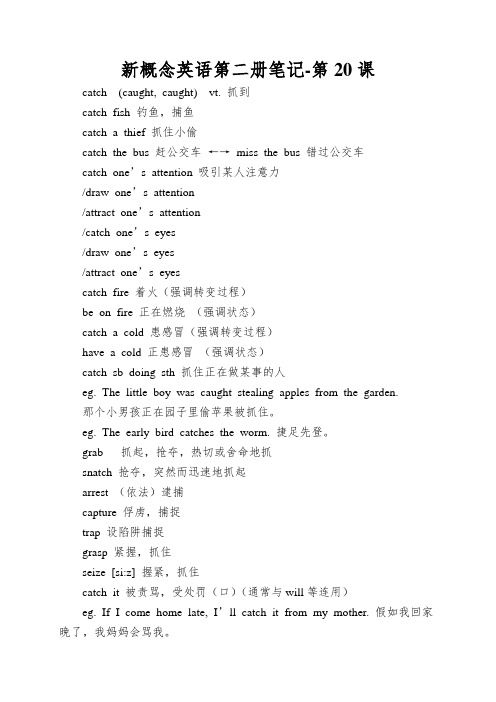
新概念英语第二册笔记-第20课catch (caught, caught) vt. 抓到catch fish 钓鱼,捕鱼catch a thief 抓住小偷catch the bus 赶公交车←→miss the bus 错过公交车catch one’s attention 吸引某人注意力/draw one’s attention/attract one’s attention/catch one’s eyes/draw one’s eyes/attract one’s eyescatch fire 着火(强调转变过程)be on fire 正在燃烧(强调状态)catch a cold 患感冒(强调转变过程)have a cold 正患感冒(强调状态)catch sb doing sth 抓住正在做某事的人eg. The little boy was caught stealing apples from the garden.那个小男孩正在园子里偷苹果被抓住。
eg. The early bird catches the worm. 捷足先登。
grab 抓起,抢夺,热切或舍命地抓snatch 抢夺,突然而迅速地抓起arrest (依法)逮捕capture 俘虏,捕捉trap 设陷阱捕捉grasp 紧握,抓住seize [si:z] 握紧,抓住catch it 被责骂,受处罚(口)(通常与will等连用)eg. If I come home late, I’ll catch it from my mother. 假如我回家晚了,我妈妈会骂我。
catch up with 赶上eg. Go ahead, please. I’ll soon catch up with you. 你先走吧,我会专门快赶上你的。
catch on (意见,时尚)受欢迎的catch phrase 标语,引人注意的句子fisherman n. 钓鱼人,渔民fish →fisherman (pl. fishermen)fish n. 鱼[C]1) fish 鱼[pl.] 单复数同形2) fishes 不同种类的鱼a big fish in a small pond. 山中无老虎猴子称霸王eg. When the cat is away, the mice will play. 老猫不在家老鼠笑呵呵。
新概念第二册20课

Fisherman/’fiʃəmən/ n.
realize /’riəlaiz/
real adj.真的realize v. 意识到reality n. 现实 1.领悟,了解,认识到 realize one’s mistake She realized that he was lying. 2.实现,使成为事实 realize one’s dream/plan The girl finally realized her dream of becoming an actress.
awesome
If something is really good, you can say it’s awesome. Awesome means it’s great.
Jacky: Did you enjoy that book?
Ella:Yes, it’s awesome!
hang in there
Instead of.. 不做….而做…(可置于句首或句尾) +n./pron./v.ing I go to school instead of staying at home. without 强调没有做某事,instead of 强调这件事没 做成而做成了另一件事
Boot /bu:t/ n.
waste/weist/
1.waste vt. 浪费 Don’t waste your time. 2. waste n. 浪费 a waste of 对…的浪费 It is a waste of time/money/food.
近义词辨析
waste 普通用词,概念广泛,指任何被丢弃的
东西。 garbage 主要指有机废料,包括厨房的剩菜剩 饭或不能再用的食物。也可作引申用。 rubbish 普通用词,指任何成堆的、破损的、 用过的或无用的东西,尤指弃掉的垃圾堆。也 可作引申用。 litter 是四下乱丢物品的总称,尤指散落于地, 有碍观瞻的废物
新概念英语第二册20课

●LESSON 201.生词与短语1)catch表示捉到的时候,还可以用:grab,seize,hold,take hold of等等Catch fish 钓鱼,捕鱼Catch thief 抓住小偷Catch the bus 赶公共汽车→miss the bus 错过公共汽车catch one’s attention Catch one’s eyesdraw one’s attention Draw one’s eyes }吸引某人注意力attract one’s attention Attract one’s eyescatch fire 燃烧,着火(强调动作)be on fire 燃烧着的,着火的(强调状态)Catch a cold 患感冒(强调动作)Have a cold 患感冒(强调状态)Catch sb. doing sth 抓住某人正在做某事Eg. The little boy was caught stealing apples from the garden.这个小男孩正在偷苹果被.抓住了。
Eg. The early bird catches the worms. 早起的鸟儿能捕到虫子。
(谚语的实际含义:捷足先登)【同义词区分】grab 抓起,抢夺,热切或拼命地抓snatch 抢夺,突然而迅速地抓起arrest (依法)逮捕capture 俘虏,捕获trap 设陷阱捕捉grasp 握紧,抓住seize 握紧,抓住catch it 被责骂,受处罚【口】(常与will等连用)Eg. If I come home late , I’ll catch it from my mother. 如果我回家晚了,妈妈会骂我的。
catch up with 赶上(某人)eg. Go ahead , please. I’ll soon catch up with you.Catch on (意见,时尚)受欢迎的Catch phrase 标语,引人注目的句子2)fishFish →fishman (pl. fishmen)Fish 鱼(c.)n..⑴fish 鱼(pl.)单复数头同形⑵fish 不同种类的鱼A big fish in a small pond. 一个小池塘里的大鱼(中文寓意:山中无老虎,猴子称霸王)Eg. When the cat is away, the mice will play.当猫不在的时候,老鼠就开始玩儿了。
新概念英语第二册Lesson20

Lesson 20 One man in a boat【New words and expressions】生词和短语★catch v. 抓到 catch fish, catch thief catch cold:染上感冒 catch a bus:赶车catch one's breath:摒住呼吸 catch sight of(see):看见catch fire:着火 catch one's eyes:吸引某人注意力★fisherman n. 钓鱼人,渔民★boot n.靴子 a pair of boots★waste n. v. 浪费 You are wasting time.a waste of: It is a waste of time.★realize v. 意识到 I realized that I was wrong.实现,realize one's dream【课文讲解】fish一般情况下作为不可数名词用There are a lot of fishes(表示种类)in the sea.fish(v.):钓鱼,捕鱼主语通常由名词和代词充当,以及动词+ingfor+时间……表示一段时间 for hours=for some hourswithout (prep.) 介词后面一定要加宾语动词+ing:1.做主语;2.做宾语anything用在否定句中without作为状语而出现,表示结果状语, without 后面的动作是主语来做.He went out without saying any words.Without asking for money, the boy went to school.(v.)worry sb. The house worried me. My daughter worried me.(adj.)be worried about 主语为宾语而感到担心I was never worried about this.instead of 后面的词一定是没有做的,可以放在主句后面without强调没有做某件事,instead of强调这件事没做成而做成了另外一件事我原准备做……但是后来做了……I go to school instead of staying at home. I bought books instead of buying dresses. less+原级 (不如) : A is less ... than Bspend+时间+在某地:在某地度过……时间after(conj.)+从句,从句主语必须是主句的主语才能换成下面一种形式after(prep.)+名词/动词的ing形式After I go to school, I learned a lot of knowledge.After going to school, I learned a lot of knowledge.with: 带着 without;没带give up doing/stop doing:放弃做某事在船上in the boatnot at all在否定句中起强调作用【Key structures】动词+ing(非谓语动词)可以做主语和宾语b.be keen on, be fond of, be interested in, enjoy+动词ingbe afraid of, be up to ,be capable of, without, instead ofc. I apologize.apologize for (not) doing sth., thank you for..., congratulate sb. on doing sth. Exercises C1.without without prep.+ doingHe went out of the restaurant without paying the bill.2.instead ofShe bought a pair of boots instead of getting a pair of shoes.=She bought a pair of boots instead of a pair of shoes.3.of : She was afraid of spending the night alone.4.afterafter+从句;after prep.+doing After hearing the news, she fainted.5.beforeThink carefully before answering my question. 在回答我的问题之前,请仔细考虑。
新概念第二册Lesson 20知识要点总结

新概念第二册Lesson 20复习要点一.L20词汇讲解:1.catch---caught---caughtcatch a fish 抓住一条鱼/catch a cold 得了感冒/catch the bus 赶公交车2.fisherman钓鱼人,渔民fireman消防员/newspaperman记者/milkman送奶工/postman邮递员/policeman警察/superman超人3.waste浪费a waster of time浪费时间/a waste of money 浪费钱/a waster of paper 浪费纸We shouldn’t waste water.我们不应该浪费水。
4.realize意识到realize the problem意识到这个问题realize that......realize a dream 实现梦想二.动名词:doing1.动名词作主语:Eating is always a pleasure.吃总是一件愉快的事情。
Fishing is my favourite sport.钓鱼是我最喜欢的运动。
2.介词后动词用ing形式:He sat there without saying anything. 他默默地坐在那儿。
She is afraid of staying in that house.她害怕待在那栋房子里。
三.重点短语:1.instead of 而不是She bought a pair of boots instead of getting a pair of shoes.她买了一双靴子,而不是一双鞋。
2.give up 放弃You must give up smoking.你必须放弃抽烟。
3.be interested in 对......感兴趣I’m not interested in fishing.我对钓鱼不感兴趣。
4.not at all 一点儿也不,一点也没有I don't want to speak at all.我一点儿也不想说话。
最新新概念英语第二册第20课

最新新概念英语第二册第20课Lesson 20 One man in a boat 独坐孤舟12Fishing is my favourite sport. I often fish for hours without catching 3anything. But this does not worry me. Some fishermen are unlucky. Instead 4of catching fish, they catch old boots and rubbish. I am even less lucky. 5I never catch anything -- not even old boots. After having spent whole 6mornings on the river, I always go home with an empty bag. 'You must give 7up fishing!' my friends say. 'It's a waste of time.' But they don't realize 8one important thing. I'm not really interested in fishing. I am only interested in sitting in a boat and doing nothing at all!910New words and expressions 生词和短语11catch v. 抓到 fisherman n. 钓鱼人,渔民 boot n. 靴子 waste n.12浪费13realize v. 意识到14参考译文钓鱼是我特别喜爱的一项运动。
我经常一钓数小时却一无所获,但我从不为1516此烦恼。
有些垂钓者就是不走运,他们往往鱼钓不到,却钓上来些旧靴子和垃17圾。
新概念英语二第二册笔记20
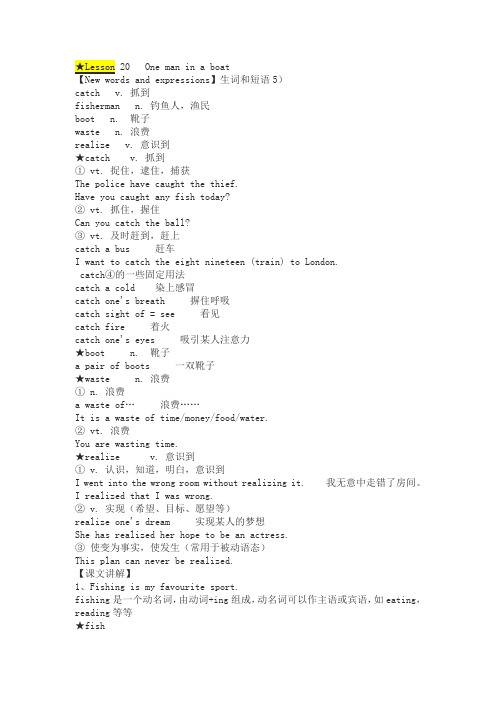
】生词和短语5)catch v. 抓到fisherman n. 钓鱼人,渔民boot n. 靴子waste n. 浪费realize v. 意识到★catch v. 抓到① vt. 捉住,逮住,捕获The police have caught the thief.Have you caught any fish today?② vt. 抓住,握住Can you catch the ball?③ vt. 及时赶到,赶上catch a bus 赶车I want to catch the eight nineteen (train) to London.catch④的一些固定用法catch a cold 染上感冒catch one's breath 摒住呼吸catch sight of = see 看见catch fire 着火catch one's eyes 吸引某人注意力★boot n. 靴子a pair of boots 一双靴子★waste n. 浪费① n. 浪费a waste of…浪费……It is a waste of time/money/food/water.② vt. 浪费You are wasting time.★realize v. 意识到① v. 认识,知道,明白,意识到I went into the wrong room without realizing it. 我无意中走错了房间。
I realized that I was wrong.② v. 实现(希望、目标、愿望等)realize one's dream 实现某人的梦想She has realized her hope to be an actress.③使变为事实,使发生(常用于被动语态)This plan can never be realized.【课文讲解】1、Fishing is my favourite sport.fishing是一个动名词,由动词+ing组成,动名词可以作主语或宾语,如eating,reading等等★fish①n. 鱼(不可数名词),鱼的种类(可数)There are a lot of fishes(表示种类)in the sea.②v. 钓鱼, 捕鱼2、I often fish for hours without catching anything.for+时间表示一段时间for hours=for some hours 数小时without catching anything作为状语而出现, 表示结果状语。
新概念英语第2册第20课重点语法句型
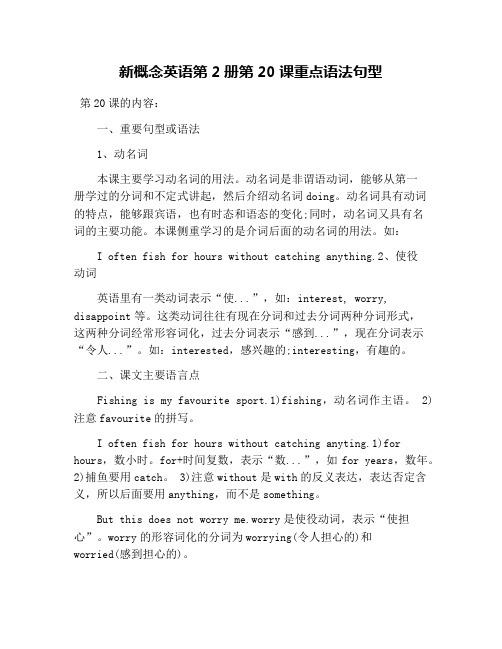
新概念英语第2册第20课重点语法句型第20课的内容:一、重要句型或语法1、动名词本课主要学习动名词的用法。
动名词是非谓语动词,能够从第一册学过的分词和不定式讲起,然后介绍动名词doing。
动名词具有动词的特点,能够跟宾语,也有时态和语态的变化;同时,动名词又具有名词的主要功能。
本课侧重学习的是介词后面的动名词的用法。
如:I often fish for hours without catching anything.2、使役动词英语里有一类动词表示“使...”,如:interest, worry, disappoint等。
这类动词往往有现在分词和过去分词两种分词形式,这两种分词经常形容词化,过去分词表示“感到...”,现在分词表示“令人...”。
如:interested,感兴趣的;interesting,有趣的。
二、课文主要语言点Fishing is my favourite sport.1)fishing,动名词作主语。
2)注意favourite的拼写。
I often fish for hours without catching anyting.1)for hours,数小时。
for+时间复数,表示“数...”,如for years,数年。
2)捕鱼要用catch。
3)注意without是with的反义表达,表达否定含义,所以后面要用anything,而不是something。
But this does not worry me.worry是使役动词,表示“使担心”。
worry的形容词化的分词为worrying(令人担心的)和worried(感到担心的)。
Some fishermen are unlucky.1)注意fisherman的拼写和复数。
2)注意unlucky的构词,即由“un-+luck+-y”构成。
Instead of catching fish,they catch old boots and rubbish.1)instead of,相反、反之。
新概念第二册第20课 Lesson20
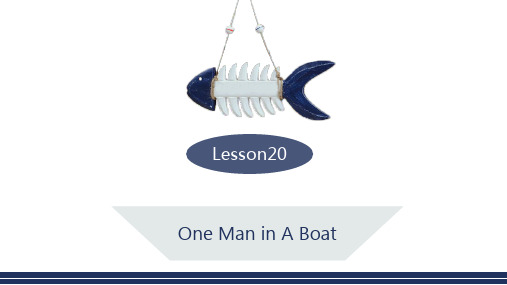
It is a more useful book than that one. .
He is more careful than his sister .
That church is the oldest building in the city .
Yesterday was the hottest day of the year .
some
【甘肃.定西】( ) 3. The boy is looking forward to exam. A. to have B. has C. having D. have
a good time after the
能加名词就是介词
【湖北·孝感】28 Jack took an interest in
非谓语动词作主语 To learn languages is my hobby Learning languages is my hobby 钓鱼是我最喜爱的运动 (fish) 看电视是浪费时间(watch TV) Fishing is my favorite sport To watch TV is a waste of time
English well. D. learned
how others reply to your message creates a great pleasure. A.Seeing B.See C.Having seen D.To be seeing
---What do you suppose made her worried?
Lesson20
One Man in A Boat
目 录
01
Review
02
Word
s
新概念英语第二册 第20课时

without强调没有做某件事, instead of 强调这件事没做成而 做成了另外一件事
• 副词instead“作为替代,反而”,单独使用时一般出现在句尾 If you don’t want a holiday in England, why don’t you go to Australia instead?
单独住在那间屋子里. 3.He is capable of doing anything. 他能胜任任何事情.
• 用动名词将两个短句连到一起.
E.g.
1.He sat there. He did not say anything. 他坐在那儿, 他什么话也不说.
He sat there without saying anything. 他默默无语 地坐在那里.
2.He turned off the radio. He left the room. 他关掉了 收音机, 他离开了房间.
Before leaving the room, he turned off the radio. 离开房间之前, 他关掉了收音机.
1.He looked at his watch. He hurried to the station.
4.He congratulated me. I won the competition. 他向我道贺. 我赢得了这次比赛.
谢谢
呼吸 • catch sight of = see 看见catch fire 着火 • catch one's eyes 吸引某人注意力
• ★fisherman n. 钓鱼人, 渔民
新概念英语第二册课堂笔记第20课
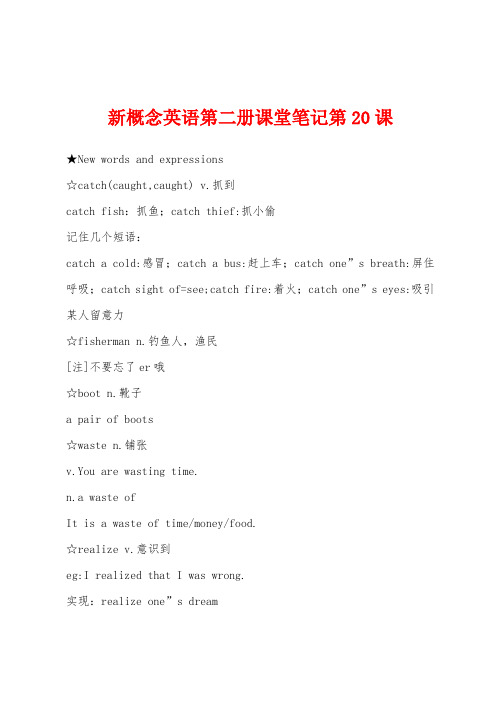
新概念英语第二册课堂笔记第20课★New words and expressions☆catch(caught,caught) v.抓到catch fish:抓鱼;catch thief:抓小偷记住几个短语:catch a cold:感冒;catch a bus:赶上车;catch one”s breath:屏住呼吸;catch sight of=see;catch fire:着火;catch one”s eyes:吸引某人留意力☆fisherman n.钓鱼人,渔民[注]不要忘了er哦☆boot n.靴子a pair of boots☆waste n.铺张v.You are wasting time.n.a waste ofIt is a waste of time/money/food.☆realize v.意识到eg:I realized that I was wrong.实现:realize one”s dream★TextOne man in a boatFishing is my favourite sport.I often fish for hours without catching anything.But this does not worry me.Some fisherman are unlucky.Instead of catching fish,they catch old boots and rubbish.I am even less lucky.I never catch anything-not even old boots.After having spent whole morning on the river,I always go home with an empty bay.”You must give up fishing!”my friends say.”It”s a waste of time.”But they don”t realize one important thing.I”m not really interested in fishing.I am only interested in sitting in a boat and doing nothing at all!●本课的重点是-ing形式☆fish n.鱼:一般状况下作为不行数名词用eg:I have bought some fish.在表示种类时为可数名词eg:There are a lot of fishes in the sea.v.钓鱼-->n.fishing主语通常由名词和代词充当。
新概念英语第二册lesson 20

interrupting you.(强调interrupt这个动词) I must apologize for having interrupted you. (强调interrupt这个 动作先发生) 以上两者时间概念不同,但意思相同
Key structures 关键句型
④ 跟动名词的短语
Key structures 关键句型
本课关键句型:动名词
动词+ing作名词时称为动名词,它仍有动词的属性,可
以接宾语,动名词可以代替名词作主语和宾语或介词 宾语。 ① 动名词作主语 ② 动名词作宾语 ③介词/副词+动名词:可以把两个句子连成一个句子。
I must apologize. I interrupted you.=I must apologize for
Realize 意识到
① v. 认识,知道,明白,意识到 I went into the wrong room without realizing it. ② vt. 实现(希望、目标、愿望等) Realize one’s dream 实现某人的梦想 ③ 使变为事实,使发生(常用于被动语态) This plan can never be realized.
Notes on the text 课文注释
You must give up fishing!
Give up doing sth.=stop doing sth. 放弃做某事
I’m not really interested in fishing.
Be interested in sth./doing sth. :对…感兴趣
Notes on the text 课文注释
新概念英语第二册第20课_

I am even less lucky. I never catch anything—not even old boots.
我的运气甚至还不及他们。 我什么东西也未钓到过—就 连旧靴子也没有。
Fishing is my _f_a_v_o_u_r_i_te_ sport. I often
fish for hours withoutc_a_t_c_h_in__ganything. But this does not _w__o_r_r_y_ me. Some _f_i_s_h_e_r_m_e_n__ are _u_n_l_u_c_k_y. _I_n_s_te_a_d_ of catching fish, they catch old boots and _ru__b_b_i_s_h. I am even less lucky. I never
The letter was posted without a stamp. 那封信没贴邮票就寄出去了。 我们到了那儿,一路上没遇到任何麻烦。 We got there without any trouble . 雨天外出不带伞会淋湿的。 You’ll get wet if you go out in the rain without an umbr.ella
5.Why is fishing the writer’s favourite sport?
He likes sitting in a boat and doing nothing at all.
【课文讲解】
1. I often fish for hours without catching anything. ①. (表否定)没有,无,不需。如:
thing. I'm not really _i_n_te_r_e_s_t_e_d_ in fishing. I am
新概念二Lesson 20 One Man in a Boat最全知识点总结

Lesson 20 One Man in a Boat◆Warm up1、动名词的用法◆Listening1. What is the author’s favorite sport?2. What do some unlucky fishermen catch.3. Why does the writer say he is even less lucky?4. What is he really interested in?◆Vocabulary● catch [kætʃ]v. 抓到;赶上;引起catches (三单);catching (现在分词);caught (过去式/分词)【记忆】catch = cat (猫)+ch (吃)→猫抓老鼠吃⑴vt. 捉住、逮住、捕获Catch fish 捕鱼⑵vt. 抓住、握住、接住catch the ball 接球catch one’s breath 屏住呼吸catch sight of = see 看见⑶vt. 引起catch a cold 染上感冒catch one’s eyes/attention 吸引某人注意力catch fire 着火⑷及时赶到、赶上catch a bus 赶车catch up with 赶上【辨析】arrest, capture, catch, seize, trap 均有"抓住,捕捉"之意。
arrest 指根据法律或命令进行逮捕并予以监禁或拘留。
capture 指通过武力或计谋等,战胜抵抗而捉住敌人或动物。
catch 普通用词,指捉住跑动或隐藏中的人或动物,一般指活捉。
seize 侧重指以突然、有力地动作迅速抓住或捉住。
trap 多指诱捕。
【例句】He stopped and let her catch up with him. 他停下来,好让她追上自己。
● fisherman [ˈfɪʃərmən] n. 钓鱼人、渔民【记忆】fisherman = fisher (渔夫) + man (人)→钓鱼人、渔民【拓展】fish n. 鱼、鱼肉fishing n. 钓鱼fisherwoman n. 渔婆⑴fish n. 鱼、鱼肉fish 用作可数名词指“鱼的条数”时,单复数相同(two fish 两条鱼);fishes 指不同种类的鱼,指鱼的种类时复数形式是fishes (two fishes两种鱼);fish用作不可数名词时无复数形式,作“鱼肉”之意(help yourself to some fish).相关谚语:Teach fish to swim 班门弄斧Drink like a fish 牛饮Like a fish out of water 如鱼离水An odd fish 奇怪的家伙⑵fish vi. 钓鱼、捕鱼go fishing 去钓鱼fish in troubled water 浑水摸鱼fish for compliments 沽名钓誉● boot [bu:t]n. 靴子【记忆】foot (脚) + boot 靴子→给脚穿上靴子【搭配】a pair of boots 一双靴子bootlace n. 鞋带boot licker 拍马屁的人give sb the boot (非正式)解雇You (can) bet your boots 准保没错、有把握with one’s heart in one;s boots 极为悲观消沉【例句】Your boot lace is untied. 你靴子上的鞋带松了。
- 1、下载文档前请自行甄别文档内容的完整性,平台不提供额外的编辑、内容补充、找答案等附加服务。
- 2、"仅部分预览"的文档,不可在线预览部分如存在完整性等问题,可反馈申请退款(可完整预览的文档不适用该条件!)。
- 3、如文档侵犯您的权益,请联系客服反馈,我们会尽快为您处理(人工客服工作时间:9:00-18:30)。
新概念英语第二册课堂笔记第20课Lesson 20
★New words and expressions
☆catch(caught,caught) v.抓到
catch fish:抓鱼;catch thief:抓小偷
记住几个短语:
catch a cold:感冒;catch a bus:赶上车;catch one's breath:屏住呼吸;catch sight of=see;catch fire:着火;catch one's eyes:吸引某人注意力
☆fisherman n.钓鱼人,渔民
[注]不要忘了er哦
☆boot n.靴子
a pair of boots
☆waste n.浪费
v.You are wasting time.
n.a waste of
It is a waste of time/money/food.
☆realize v.意识到
eg:I realized that I was wrong.
实现:realize one's dream
★Text
One man in a boat
Fishing is my favourite sport.I often fish for hours without catching anything.But this does not worry me.Some fisherman are unlucky.Instead of catching fish,they catch old boots and rubbish.I am even less lucky.I never catch
anything-not even old boots.After having spent whole morning on the river,I always go home with an empty bay.'You must give up fishing!'my friends say.'It's a waste of time.'But they don't realize one important thing.I'm not really interested in fishing.I am only interested in sitting in a boat and doing nothing at all!
●本课的重点是-ing形式
☆fish n.鱼:一般情况下作为不可数名词用
eg:I have bought some fish.
在表示种类时为可数名词
eg:There are a lot of fishes in the sea.
v.钓鱼-->n.fishing
主语通常由名词和代词充当。
动词 ing就变成名词词性
如:eat->eating;read->reading
☆...without catching anything.
without(prep),介词后面一定要加宾语
同样,动词 ing变为名词做宾语
without doing作为状语而出现,表示结果状语
eg:He went out without saying any words.
Without asking for money,the boy went to school.
without后面的动作由主语来做
☆instead of后面的词一定是没有做的,能够放在主句后面
与without比较:
without强调没有做某事
instead of强调这件事没做成而做成了另外一件事(有“代替”的含义)
翻译成:我原准备做……但是后来做了……
eg:I go to school instead of staying at home.
I bought books instead of buying dresses.
☆v.worry sb:宾语为主语而感到担心
adj.be worried about:主语为宾语而感到担心
☆less 原级
A is less...than B.“不如”
☆after
after 从句(连词)从句的主语必须是主句的主语才能换成下面一种形式
after 名词/动词ing形式
eg:After I go to school,I learned a lot of knowledge.
=After going to school,I learned a lot of knowledge.(主语都是I)
☆give up doing=stop doing:放弃做某事。
